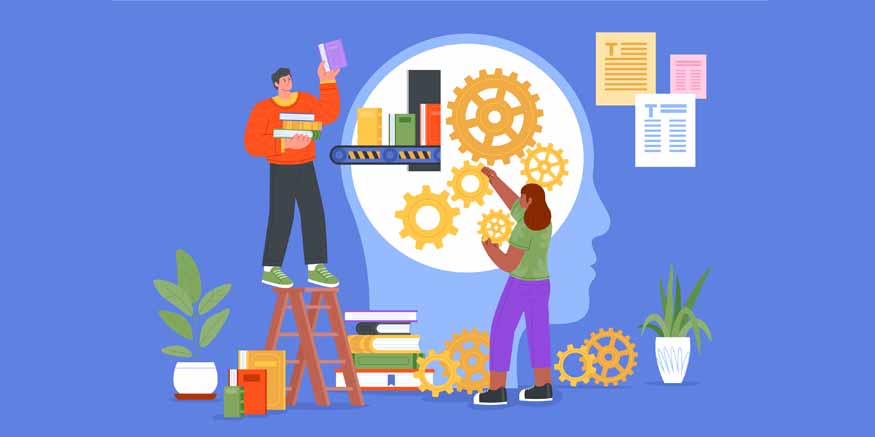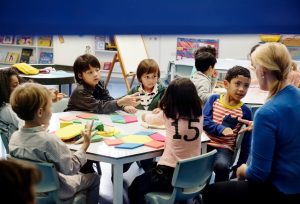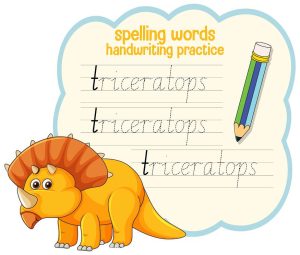Critical Thinking – An Essential Skill for Young Children Today

We are living in a world that is changing at an astonishing pace. As a parent, it is often a challenge to know what skills and abilities one must instill in their child to help them succeed in the future. Much has been said about the importance of developing Life Skills in young children. These are skills like Critical Thinking, Creativity, Communication and Collaboration that will help children navigate the world of tomorrow.
Developing Critical Thinking Skills will help young minds grow into self-assured, free thinking individuals, who are easily able to adapt to the changing world around them – at school, on the playground and at home as well. Let’s explore critical thinking skills, their value, and useful activities to help children develop these abilities.
Critical Thinking is the ability to process information by understanding facts and nuances, connecting them to the situation around you, and using logic to form thoughts, ideas and opinions. A strong Foundation in Critical Thinking skills gives children the ability to solve issues they encounter in their daily lives, helping them make wise choices and deal with challenges they face. It is important for both personal and academic success. Children who can think critically can assess, look over, and make sense of information. These skills can be developed by encouraging young minds to question ideas, think clearly, see multiple solutions and understand how to process different opinions.
Using critical thinking may transform a child’s learning experience – especially when most educational systems in India focus on rote learning and memory. Besides making learning easier and more interesting, Critical Thinking Skills benefit children in their daily lives as well. For example, a child uses critical thinking when they have to figure out how to do something hard, or settle a fight with a friend. Critical Thinking exercises help spark curiosity and interest among children, and creates an environment where they can grow and thrive.
It is impossible to overestimate the value of training critical thinking abilities.
- Better Academic Results: Students who have a high capacity for critical thought outperform their peers in the classroom. They have a superior grasp of difficult ideas, text analysis skills, and solid writing abilities. This results in higher grades and greater awareness of the things students study.
- Improved Communication Skills: Effective and clear expression of ideas is a strength of critical thinkers. They can build well-reasoned arguments and effectively express their ideas. This ability is beneficial in social and professional contexts besides academic ones.
- Improved Decision-Making: Children who engage in critical thinking are better equipped to make correct decisions. They gain the ability to analyse benefits and drawbacks, and think through options. This ability is essential for everyday choices as well as life decisions – such as choosing a career pathway.
- Emotional Intelligence: Critical thinking requires the ability to understand, control, and empathise with others’ feelings. Children who have critical thinking skills are better at controlling their emotions and detecting the emotions of those around them. This results in more positive connections.
- Adaptability: The capacity to adjust to changing situations and environments is essential in our society. Critical thinkers are more flexible and open to fresh perspectives and ideas. They have the strength and self-assurance needed to handle change, which is crucial for success in any industry.
- Ethical Understanding: Children who engage in critical thinking are better able to form moral and ethical views. They have an enhanced sense of right and wrong as a result of learning to challenge the justice and fairness of different situations. This is especially crucial for raising law-abiding, respectful people.
- Lifelong Learning: Critical thinkers are interested in and like learning new things. They are more likely to live as lifelong learners who are always looking to learn and develop. In a world where lifelong learning is the norm, this mindset is important.
Including critical thinking exercises in your child’s routine can be as much fun as it is useful! Try some of these activities:
- Brain teasers and Puzzles: These tasks force children to use reason and strategy in their thinking. These games include jigsaw puzzles, Sudoku, and Rubik’s Cubes. It improves problem-solving abilities and promotes patience.
- Debates and Discussions: Get your child involved in debates on a range of subjects. Through this activity, they improve their ability to think, express themselves, and explore other’s views. Urge them to provide facts and evidence to back up their claims.
- Science Experiments: Easy experiments done at home may spark interest and promote reasoning. Children learn about hypotheses, observations, and conclusions via projects like building a volcano out of vinegar and baking soda.
- Role-playing games: Let children assume diverse roles in various situations. These games aid in empathy development and help understand a range of viewpoints. Also, it improves their ability to solve problems in a variety of situations.
Critical thinking skills in children are important for their learning as well as growth. These skills help them analyse, test, and create what is relevant in the current world. To create a curious environment where children can think for themselves, everyday activities should have exercises that promote critical thinking amongst children. Fostering these skills early on may have a big influence on your child’s future.








